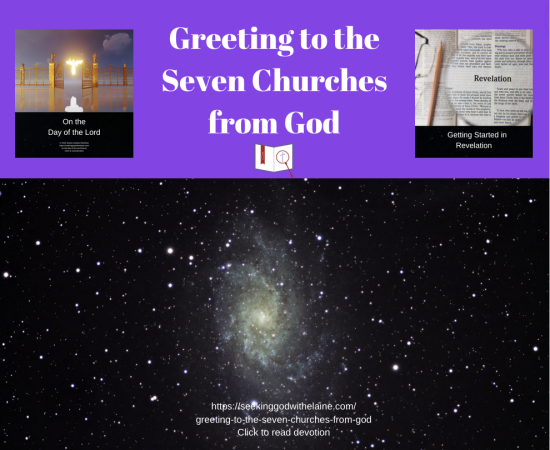As the Book of Revelation is a letter, the standard greeting was used to identify the seven Messianic congregations to whom it is written. This devotional reading looks at the greeting from the Trinity blessing the congregations and the blessing bestowed on them.
Nuggets
- John wrote a letter to fellow believers.
- John’s salutation was a combination of the Greek salutations with the Hebrew salutations.
- John again made it clear that the message was from God.
- The Holy Spirit is always before God, waiting to do His bidding.

Many of the books in the New Testament are letters. That is why they are called epistles.
The Book of Revelation is also a letter. John tells us early in Revelation 1 that he is the author and who his intended audience is.
Let's Put It into Context
To read devotions in the On the Day of the Lord theme, click the button below.
Devotions in the Getting Started in Revelation study
Related Links
We the People
Addressing the Seven Messianic Communities
“John to the seven churches that are in Asia: Grace to you and peace from him who is and who was and who is to come, and from the seven spirits who are before his throne and from Jesus Christ the faithful witness, the firstborn of the dead, and the ruler of kings on earth …” (Rev. 1: 4-5 ESV)
John wrote a letter to fellow believers.
The letter was written by the Apostle John. I know, there is some debate on whether it was really him or someone else named John. Nothing that I have seen has persuaded me to think differently.
However, we are only on verse 4, and the man – who never mentioned himself by name in either the gospel he wrote or the three epistles – has mentioned his name twice (Rev. 1: 1 and Rev. 1: 4). And he will again before we get out of Revelation 1 (Rev. 1: 9).
That tells me that John wanted no debate as to who the human author of the letter was.
To me, it is logical that the revelation was given to the Apostle John. Have you ever thought why?
I know. At this point, he was the only Apostle alive.
God could have changed the timing of the visions. He could have changed the recipient. He could have given it at a different location.
But God chose John. The fisherman. The uneducated man.
True, it probably has something to do with the fact that John had written a gospel and three epistles. He was already an author.
But so was Peter. He had written two letters, and it is assumed that he helped Mark with his gospel. Peter comes across as Messiah’s pet.
I don’t think that he has past writing endeavors is the only reason John got this gig. God knew John’s heart. He knew of John’s loyalty to Himself and Jesus.
God knew that John would be faithful in recording the visions and broadcasting them – especially to the seven churches.
God knew He could depend on John.

We’re going to talk about the seven churches later.
Grace and Peace
“John to the seven churches that are in Asia: Grace to you and peace ...” (Rev. 1: 4-5 ESV)
John’s salutation was a combination of the Greek salutations with the Hebrew salutations.
Paul used this format for every one of His letters. The only exceptions are when he addresses Timothy and Titus – his “sons” in the ministry. He adds mercy.
Second Peter and II John also utilize this wording. Jude began his letter with “Mercy, peace and love be yours in abundance.” (Jude 1: 2 ESV). First Peter just says greetings.
It was also the standard greeting of the shema. If shalom means Tom wants Sally to experience full well-being and peace, that can only happen through experiencing the shema. “You shall love the Lord your God with all your heart and with all your soul and with all your might” (Deut. 6: 5 ESV).
The greeting helps show us the purpose of the Book of Revelation. It shows us God’s grace in providing salvation to His disobedient creation. It also shows salvation brings peace, which will be ours for eternity.
From God
“... from him who is and who was and who is to come …” (Rev. 1: 4-5 ESV)
John again made it clear that the message was from God.
John’s greeting also represents the Trinity as he did in Revelation 1: 1, but this time he goes farther into acknowledging the Trinity (without, again, acknowledging it). The Trinity is God the Father, God the Son, and God the Holy Spirit, three distinct Persons within one indivisible Divine nature.
Grace and peace flow from the Godhead.
The first Person is God. “… from him who is and who was and who is to come …” (Rev. 1: 4 ESV). This message comes from God Himself.
This refers to God’s eternal, self-existent, and immutable character. Because He has these attributes, we can worship Him.
To read a devotion in the Finding Our Center series, click on the button below.
From the Seven Spirits
“... from the seven spirits who are before his throne …” (Rev. 1: 4-5 ESV)
The Holy Spirit is always before God, waiting to do His bidding.
John’s terminology here was familiar but not familiar to me. The second Person listed here is the Holy Spirit.
I know. Usually, the order is the Father, Son, and Holy Ghost. Additionally, I’ve never caught the number of spirits. “… from the seven spirits who are before his throne” (Rev. 1: 4 ESV).
It is the number seven again, so that indicates a completeness. It symbolizes holiness. That is a good description of the Holy Spirit – it is in the name.
I did find a verse that applies, also. “And the Spirit of the Lord shall rest upon him, the Spirit of wisdom and understanding, the Spirit of counsel and might, the Spirit of knowledge and the fear of the Lord” (Isa. 11: 2 ESV).
As I just said, that is a good description of the Holy Spirit.
The Holy Spirit has an important job to perform. Let’s look at some of the things He does:
- The power of the Holy Spirit should provide us with a hope as we grow in our faith (Rom. 15: 13).
- The Holy Spirit will serve as an advocate for us with the Father (Jn. 14: 16).
- The Spirit will teach us what we don’t know and will remind us what we do know (Jn. 14: 26).
- When we pray in the Spirit (Jude 1: 20-21), He helps us pray when we cannot (Rom. 8: 26).
- The Holy Spirit helps us to speak when we are being persecuted for our faith (Mk. 13: 11) just as He carried the prophets in proclaiming God’s message (II Pet. 1: 21).
- The Holy Spirit is a witness to us about what God has done (Ac. 5: 32) and testifies about Him (Jn. 15: 26).
- The Holy Spirit knows the thoughts of God (I Cor. 2: 11).
- We will have help in following God’s laws and commandments (Ezek. 36: 27).
- We are saved by “… renewal by the Holy Spirit (Ti. 3: 5 ESV).
We can’t focus only on what the Holy Spirit does for us. We have to realize His primary mission.
“The Spirit of the Lord God is upon me, because the Lord has anointed me to bring good news to the poor; he has sent me to bind up the brokenhearted, to proclaim liberty to the captives, and the opening of the prison to those who are bound; to proclaim the year of the Lord’s favor, and the day of vengeance of our God; to comfort all who mourn; to grant to those who mourn in Zion — to give them a beautiful headdress instead of ashes, the oil of gladness instead of mourning, the garment of praise instead of a faint spirit; that they may be called oaks of righteousness, the planting of the Lord, that he may be glorified” (Isa. 61: 1-3 ESV).
Don’t gloss over where the seven spirits are. “… who are before his throne …” (Rev. 1: 4 ESV). This is evidence of the distinctness of the Three Persons of the Trinity.
But it also showcases the fact that the Holy Spirit is to be a mouthpiece for God. He is to share His praises with all who will listen. He is there to do the bidding of the Heavenly Father.

How Do We Apply This?
- Accept that the Book of Revelation is applicable to our lives today.
- Listen to the Holy Spirit as He is God’s mouthpiece.
Father God. We know that John had a very specific audience in mind for his letter, but we also know that it is applicable to our lives today. Thank You that it is Your message to us and that You have given us the Holy Spirit to interpret it to guide us toward a closer relationship with You. Amen.
What do you think?
Leave me a comment below (about this or anything else) or head over to my Facebook group for some interactive discussion.
If you don’t understand something and would like further clarification, please contact me.
If you have not signed up for the email providing the link to the devotions and the newsletter, do so below.
If God has used this devotion to speak with you, consider sharing it on social media.